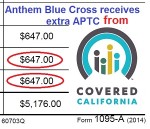Information from a consumer’s 1095-A Marketplace Statement reveals that Covered California continued to credit Anthem Blue Cross with Advance Premium Tax Credits (APTC) even after the consumer had transitioned to Medi-Cal. While there doesn’t appear to be any fraud, Anthem did receive at least $647 for an individual who was no longer a member of their […]











